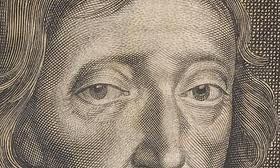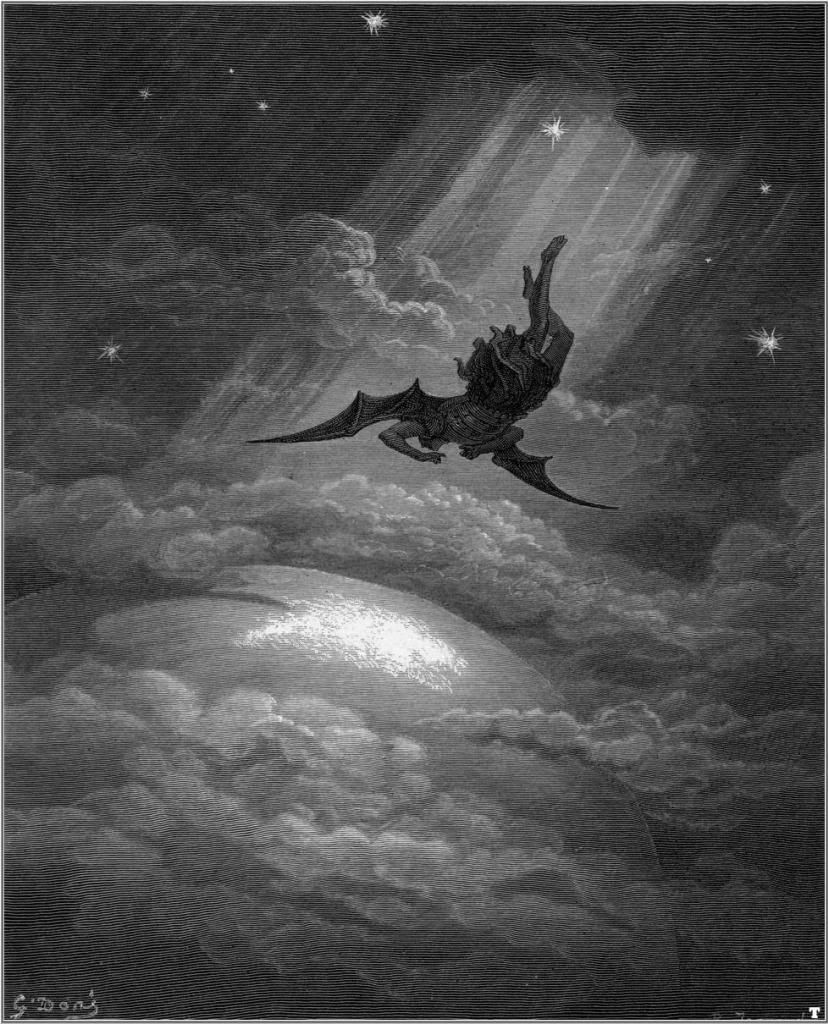
John Milton (9 December 1608 – 8 November 1674) was an English poet, polemicist, a scholarly man of letters, and a civil servant for the Commonwealth of England under Oliver Cromwell. He wrote at a time of religious flux and political upheaval, and is best known for his epic poem Paradise Lost.
Milton's poetry and prose reflect deep personal convictions, a passion for freedom and self-determination, and the urgent issues and political turbulence of his day. Writing in English, Latin, and Italian, he achieved international renown within his lifetime, and his celebrated Areopagitica (written in condemnation of pre-publication censorship) is among history's most influential and impassioned defenses of free speech and freedom of the press.
William Hayley's 1796 biography called him the "greatest English author,"[1] and he remains generally regarded "as one of the preeminent writers in the English language,"[2] though critical reception has oscillated in the centuries since his death (often on account of his republicanism). Samuel Johnson praised Paradise Lost as "a poem which...with respect to design may claim the first place, and with respect to performance, the second, among the productions of the human mind," though Johnson (a Tory and recipient of royal patronage) described Milton's politics as those of an "acrimonious and surly republican".
Because of his republicanism, Milton has been the subject of centuries of British partisanship (a "nonconformist" biography by John Toland, a hostile account by Anthony à Wood etc
Milton's poetry and prose reflect deep personal convictions, a passion for freedom and self-determination, and the urgent issues and political turbulence of his day. Writing in English, Latin, and Italian, he achieved international renown within his lifetime, and his celebrated Areopagitica (written in condemnation of pre-publication censorship) is among history's most influential and impassioned defenses of free speech and freedom of the press.
William Hayley's 1796 biography called him the "greatest English author,"[1] and he remains generally regarded "as one of the preeminent writers in the English language,"[2] though critical reception has oscillated in the centuries since his death (often on account of his republicanism). Samuel Johnson praised Paradise Lost as "a poem which...with respect to design may claim the first place, and with respect to performance, the second, among the productions of the human mind," though Johnson (a Tory and recipient of royal patronage) described Milton's politics as those of an "acrimonious and surly republican".
Because of his republicanism, Milton has been the subject of centuries of British partisanship (a "nonconformist" biography by John Toland, a hostile account by Anthony à Wood etc
Paradise Lost

The poem is separated into twelve "books" or sections, and the length of each book varies greatly (the longest being Book IX, with 1,189 lines, and the shortest Book VII, having 640). The Arguments at the head of each book were added in subsequent imprints of the first edition. Originally published in ten books, in 1674 a fully "Revised and Augmented" edition with a new division into twelve books was issued. This is the edition that is generally used today.
The poem follows the epic tradition of starting in medias res (Latin for in the midst of things), the background story being recounted later.
Milton's story has two narrative arcs: one is of Satan (Lucifer) and the other is of Adam and Eve. It begins after Satan and the other rebel angels have been defeated and banished to Hell, or, as it is also called in the poem, Tartarus. In Pandæmonium, Satan employs his rhetorical skill to organise his followers; he is aided by Mammon and Beelzebub. Belial and Moloch are also present. At the end of the debate, Satan volunteers to poison the newly-created Earth and God's new and most favoured creation, Mankind. He braves the dangers of the Abyss alone in a manner reminiscent of Odysseus or Aeneas. After an arduous traverse of the Chaos outside Hell, he enters God's new material World, and later the Garden of Eden.
At several points in the poem, an Angelic War over Heaven is recounted from different perspectives. Satan's rebellion follows the epic convention of large-scale warfare. The battles between the faithful angels and Satan's forces take place over three days. The final battle involves the Son of God single-handedly defeating the entire legion of angelic rebels and banishing them from Heaven. Following the purging of Heaven, God creates the World, culminating in his creation of Adam and Eve. While God gave Adam and Eve total freedom and power to rule over all creation, He gave them one explicit command: not to eat from the Tree of the knowledge of good and evil on penalty of death.
The story of Adam and Eve's temptation and fall is a fundamentally different, new kind of epic: a domestic one. Adam and Eve are presented for the first time[citation needed] in Christian literature as having a full relationship while still being without sin. They have passions and distinct personalities. Satan, disguised in the form of a serpent, successfully tempts Eve to eat from the Tree by preying on her vanity and tricking her with rhetoric. Adam, learning that Eve has sinned, knowingly commits the same sin. He declares to Eve that since she was made from his flesh, they are bound to one another so that if she dies, he must also die. In this manner, Milton portrays Adam as a heroic figure, but also as a greater sinner than Eve, as he is aware that what he is doing is wrong.
After eating the fruit, Adam and Eve have lustful sex, and at first, Adam is convinced that Eve was right in thinking that eating the fruit would be beneficial. However, they soon fall asleep and have terrible nightmares, and after they awake, they experience guilt and shame for the first time. Realizing that they have committed a terrible act against God, they engage in mutual recrimination.
Eve's pleas to Adam reconcile them somewhat. Her encouragement enables Adam and Eve both to approach God, to "bow and sue for grace with suppliant knee", and to receive grace from God. Adam is shown a vision by the angel Michael, in which Adam witnesses everything that will happen to mankind until the Great Flood. Adam is very upset by this vision of humankind's future, and so Michael also tells him about humankind's potential redemption from original sin through Jesus Christ (whom Michael calls "King Messiah").
Adam and Eve are cast out of Eden, and Michael says that Adam may find "a paradise within thee, happier far". Adam and Eve also now have a more distant relationship with God, who is omnipresent but invisible (unlike the tangible Father in the Garden of Eden).
The poem follows the epic tradition of starting in medias res (Latin for in the midst of things), the background story being recounted later.
Milton's story has two narrative arcs: one is of Satan (Lucifer) and the other is of Adam and Eve. It begins after Satan and the other rebel angels have been defeated and banished to Hell, or, as it is also called in the poem, Tartarus. In Pandæmonium, Satan employs his rhetorical skill to organise his followers; he is aided by Mammon and Beelzebub. Belial and Moloch are also present. At the end of the debate, Satan volunteers to poison the newly-created Earth and God's new and most favoured creation, Mankind. He braves the dangers of the Abyss alone in a manner reminiscent of Odysseus or Aeneas. After an arduous traverse of the Chaos outside Hell, he enters God's new material World, and later the Garden of Eden.
At several points in the poem, an Angelic War over Heaven is recounted from different perspectives. Satan's rebellion follows the epic convention of large-scale warfare. The battles between the faithful angels and Satan's forces take place over three days. The final battle involves the Son of God single-handedly defeating the entire legion of angelic rebels and banishing them from Heaven. Following the purging of Heaven, God creates the World, culminating in his creation of Adam and Eve. While God gave Adam and Eve total freedom and power to rule over all creation, He gave them one explicit command: not to eat from the Tree of the knowledge of good and evil on penalty of death.
The story of Adam and Eve's temptation and fall is a fundamentally different, new kind of epic: a domestic one. Adam and Eve are presented for the first time[citation needed] in Christian literature as having a full relationship while still being without sin. They have passions and distinct personalities. Satan, disguised in the form of a serpent, successfully tempts Eve to eat from the Tree by preying on her vanity and tricking her with rhetoric. Adam, learning that Eve has sinned, knowingly commits the same sin. He declares to Eve that since she was made from his flesh, they are bound to one another so that if she dies, he must also die. In this manner, Milton portrays Adam as a heroic figure, but also as a greater sinner than Eve, as he is aware that what he is doing is wrong.
After eating the fruit, Adam and Eve have lustful sex, and at first, Adam is convinced that Eve was right in thinking that eating the fruit would be beneficial. However, they soon fall asleep and have terrible nightmares, and after they awake, they experience guilt and shame for the first time. Realizing that they have committed a terrible act against God, they engage in mutual recrimination.
Eve's pleas to Adam reconcile them somewhat. Her encouragement enables Adam and Eve both to approach God, to "bow and sue for grace with suppliant knee", and to receive grace from God. Adam is shown a vision by the angel Michael, in which Adam witnesses everything that will happen to mankind until the Great Flood. Adam is very upset by this vision of humankind's future, and so Michael also tells him about humankind's potential redemption from original sin through Jesus Christ (whom Michael calls "King Messiah").
Adam and Eve are cast out of Eden, and Michael says that Adam may find "a paradise within thee, happier far". Adam and Eve also now have a more distant relationship with God, who is omnipresent but invisible (unlike the tangible Father in the Garden of Eden).